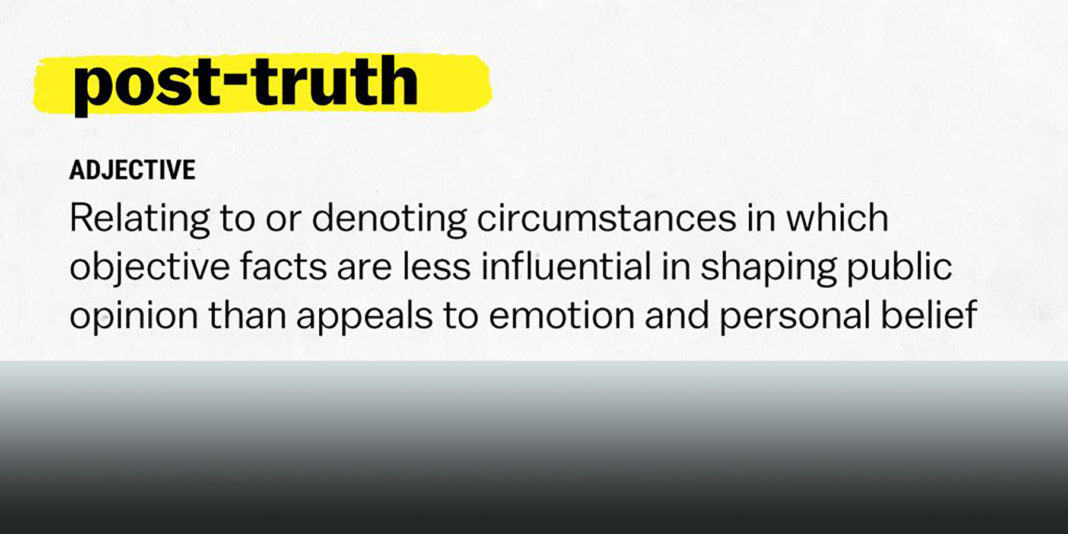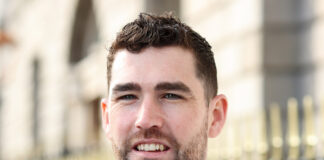If we live in a multiple-choice reality where objective truth and personal opinion are afforded equal weight, we are in very serious trouble indeed, writes Donal O’Keeffe.
“I just wanted to do some good and went about it the wrong way,” Edgar Maddison Welch told the New York Times last month.
Welch, 28, claimed he had set out on his drive to Washington from his North Carolina home intending only to give the Comet Ping Pong pizza restaurant a ‘closer look’. But while on the way, he said he felt his “heart breaking over the thought of innocent people suffering”.
Believing that children – the victims of a hugely powerful paedophile ring – were imprisoned in the building, Welch brought an AR-15 assault rifle into the restaurant and fired it numerous times, according to court documents. Welch eventually exited the restaurant with his hands up and was arrested on the spot.
Asked what he thought when he discovered there were no children being held captive in the restaurant, Welch conceded: “The intel on this wasn’t 100 percent.”
Welch – described by friends as ‘well-meaning’, was getting his ‘intel’ from the internet and – at the time of his arrest – he was still unwilling to accept that the story was completely groundless.
Welch had fallen for a fake news story known as ‘pizzagate’, an utterly unfounded, bizarre conspiracy theory – spread by Trump supporters – which claims that Hillary Clinton is the head of a global paedophile ring. Craig Silverman of Buzzfeed offers an exhaustive breakdown of how the story was spread but the key point is this: it is little short of a miracle that this lie didn’t kill someone.
You might have heard – especially if you only get your news on Facebook – that Pope Francis endorsed the presidential candidacy of alleged human being Donald J Trump. Catholics in the American mid-west certainly heard, and they shared the news virally. The story was, of course, what Flanderses would call complete bullcrap. Pope Francis had done no such thing and had, instead, mildly urged candidates – i.e. Trump – to tone down the rhetoric.
In fact, the Pope had previously had a go at Trump, saying “A person who thinks only about building walls, wherever they may be, and not building bridges, is not Christian.”
Trump – deeply unpleasant four year old that he is – responded by basically dog-whistling to ISIS that they might want to attack the Vatican some time.
The US presidential election spawned a spate of fake news stories. Some were powered in part by Facebook’s echo-chamber algorithms which give us stories similar to those we already like, some by the entrepreneurial nous of kids in Macedonia cashing in on the stupidity of Trump fans and some seem to have been a sophisticated Russian propaganda campaign to undermine US democracy even more than US democracy does.
In the wake of Trump’s election, President Obama said: “If we are not serious about facts and what’s true and what’s not, if we can’t discriminate between serious arguments and propaganda, then we have problems.”
The new media ecosystem “means everything is true and nothing is true,” Obama told The New Yorker. “An explanation of climate change from a Nobel Prize-winning physicist looks exactly the same on your Facebook page as the denial of climate change by somebody on the Koch brothers’ payroll.”
Depressingly, an appeal to emotion will – excuse the word – trump facts every time. Thus, a video posted by the anti-vaccine group R.E.G.R.E.T. can get over a million views on Facebook. The HSE’s rebuttal received about 500 views.
The Oxford Dictionaries made ‘post-truth’ their 2016 word of the year. Post-truth is defined as “relating to or denoting circumstances in which objective facts are less influential in shaping public opinion than appeals to emotion and personal belief”.
Really, though, if you want to know what is ‘post-truth’, you need look no further than the brilliant Blindboy Boatclub of the Rubberbandits for an incisive explanation.
It could be argued that ‘post-truth’ dates back to 2005, when the comedian Stephen Colbert coined the word ‘truthiness’. Colbert defined truthiness as “the belief in what you feel to be true rather than what the facts will support”. It doesn’t need to be truthful, it just needs to feel truthy.
This was back when George W Bush was capitalising on 9/11 to embark on his own deluded crusade to re-draw the map of the Middle East.
Of the nineteen 9/11 hijackers, one was from Lebanon, one was from Egypt and two were from the United Arab Emirates. The remaining fifteen were from Saudi Arabia. No credible evidence was ever produced to link them to the Iraqi dictatorship.
So, let’s go get Saddam because, well, truthiness.
The Dubya Era may seem a more innocent time now the incoming US president is a spray-tanned, racist, thin-skinned narcissist who has actually confessed to sexually assaulting women and who appears to think that not using nuclear weapons seems a bit of a waste, but every time ISIS beheads a hostage and every time a Russian plane rains down hell on a Syrian hospital, it’s worth remembering that time Tony Blair allegedly had a good old pray in George Junior’s Crawford ranch.
False balance has a lot to answer for too. You know the set-up. Panel debate on what Irish Pictorial Weekly calls “One Of Those Programmes“. The moderator is there to ringmaster the circus and to encapsulate the opposing arguments, often better than is done by those there to present their case.
Let’s say the issue is, for example, Fatal Foetal Abnormality. On one side is an obstetrician, perhaps the Master of Holles Street or the Rotunda. Beside the doctor is a woman who has lost a child to fatal foetal abnormality. Opposite is perhaps a member of the Iona ‘Institute’, maybe the Senator who seems to get elected for being very Catholic. Beside them might be a conveyancing solicitor from the ‘Pro-Life’ Campaign.
Each contributor is given equal time by the moderator.
The debate is between, on one side, an internationally respected expert, and someone who has the insight of having lived through an unspeakable personal tragedy, and on the other, two people whose entire qualification in this area is that they are very religious.
That’s false balance.
That’s what gives us, say, a climate change debate where one side is 99% of climatologists agreeing that climate change is man-made and the other is a Healy-Rae cute-hoorishly questioning the climatologists’ motivation.
In 1921, C.P. Scott, the editor of what was then the Manchester Guardian, wrote “Comment is free but facts are sacred”.
A century later and we live in a multiple-choice world where comment and facts have become interchangeable, where objective truth is no longer distinguishable from personal opinion, where everything is true and nothing is true.
Obama is right. To say the least, we have problems.








